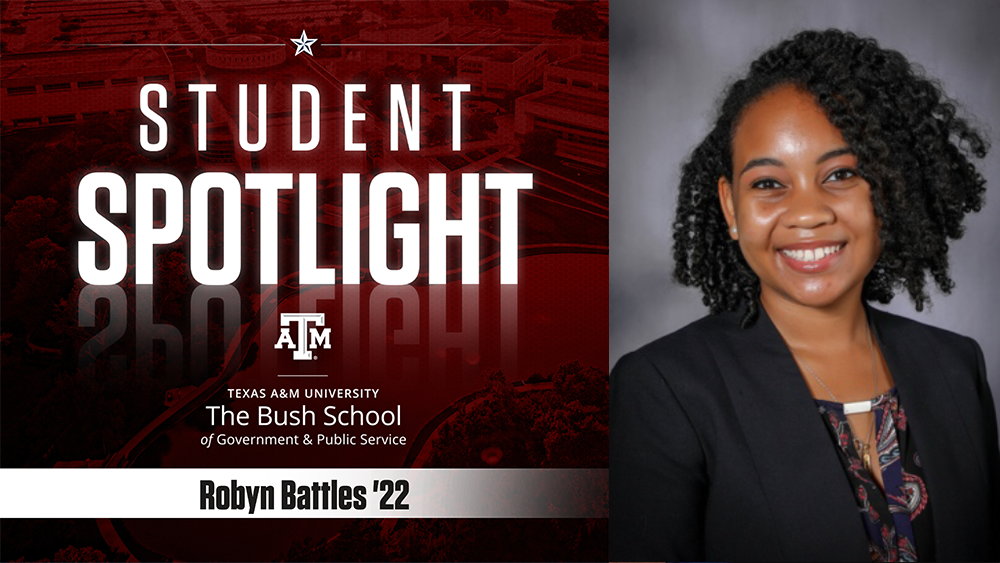
The Bush School is fully committed to its mission of educating and training principled leaders as well as performing service. Learn more about why students have chosen the Bush School of Government & Public Service as Robyn Battles, (class of 2022) Master of International Affairs candidate, discusses her experience at the Bush School. Robyn is in the National Security and Diplomacy track.
Tell us about yourself.
My name is Robyn Battles. I did my undergrad at Texas A&M University at Galveston, where I studied maritime public policy and communication. I’m currently enrolled in the Masters of International Affairs program here at the Bush School.
How would you describe your Bush School experience thus far?
Educational, but not in the way that I’m just taking classes and gaining new information. I’ve gotten a lot of practical experience that will help me in the future. It’s eye-opening. I’ve learned so many new areas of study that I wouldn’t have been exposed to before. I came in thinking I knew exactly what I wanted, and I have not totally changed it but have had my horizons expanded. It’s been a rewarding process.
What did you do in the summer between your first and second year, and how did it supplement your education and/or career search?
I interned as a research fellow for U.S. INDOPACOM. I got to spend my summer in Hawaii doing research on climate security issues. That was a new field of study for me, but it was great to be able to use the research skills I had learned in school, apply them to real world issues and create a product that could be used for the Department of Defense. That was really cool—to be able to come away with that experience and having something tangible I can point to. It was cool to see how some of the concepts that we learn in class—about grand strategy and partnerships and alliances with other countries—how that actually works in the real world and the nitty-gritty of how the interagency liaisons with each other. All that stuff was really interesting to watch in real time and not just learn about it or read about it in class. The Bush School gave me the vocabulary, know-how and background information I used doing my internship. But I think the internship gave me a broader perspective, being able to see how these things actually interact.
What is a challenge you encountered related to your Bush School education up to this point and how did you overcome it?
The biggest thing was imposter syndrome. I didn’t have a strong background in international affairs or world politics when I came in. It felt like a lot of my peers did know a lot about these subjects. That was difficult to work through. I’m still working through it and realizing that just because my strengths aren’t the same as my peers’ strengths, it doesn’t mean that I’m any more or less capable than they are. Having that awareness and understanding that we all are interested in different things, are talented and have our strengths and weaknesses in different areas—just understanding each other’s humanness—helped me overcome feeling like I’m the only one in the room that doesn’t know what’s going on. In reality, some weeks a subject comes up that you’re like, “I’ve been studying this since undergrad. I know exactly what’s going on.” Your peers highly regard you for that. Then some weeks it’s just your turn to stop, listen and absorb the information.
What advice would you give to first-years?
Don’t be afraid to step out of your comfort zone, especially when it comes to doing your assignments. My tendency was just to write on what I knew about because that’s what I felt comfortable with, and sometimes it’s the easiest. I already felt insecure about how much I knew about international affairs in general. But I would take this opportunity to just expand the breadth of your knowledge. You can definitely specialize, and if you want to get down into particular areas of the world you can. But I would recommend you take the opportunity to push yourself into research about other areas in the world, because ultimately that makes you more well-rounded. Being able to draw from different times in history, in different places around the world, makes you a better candidate for finding jobs and makes you a more cultured person in general. I think there’s probably a tendency to stick with what you know. I would use some of my assignments as an opportunity to learn about something that I didn’t know before.

